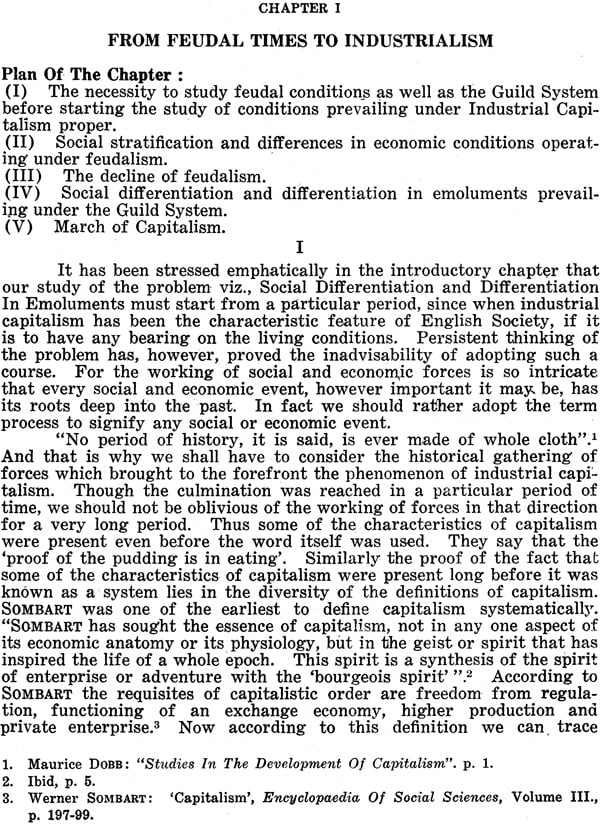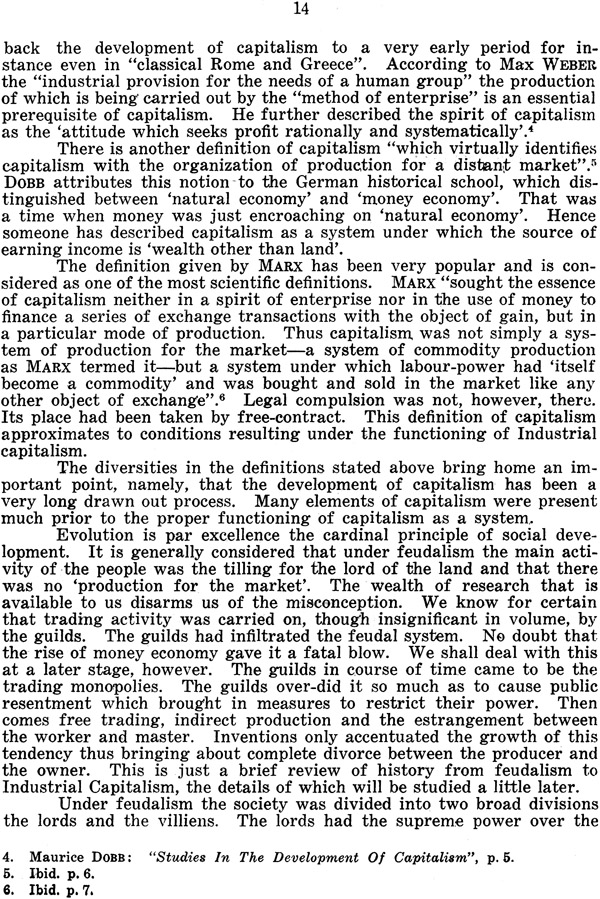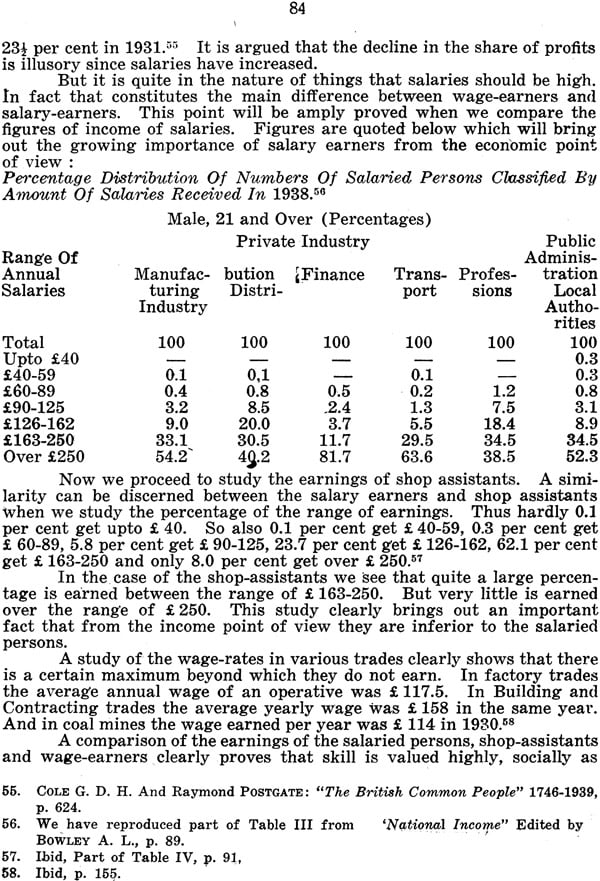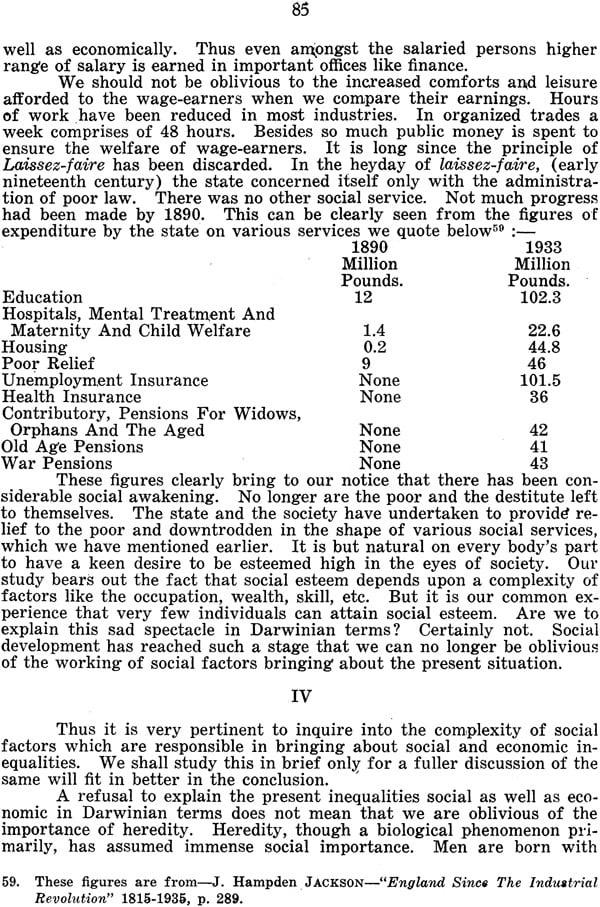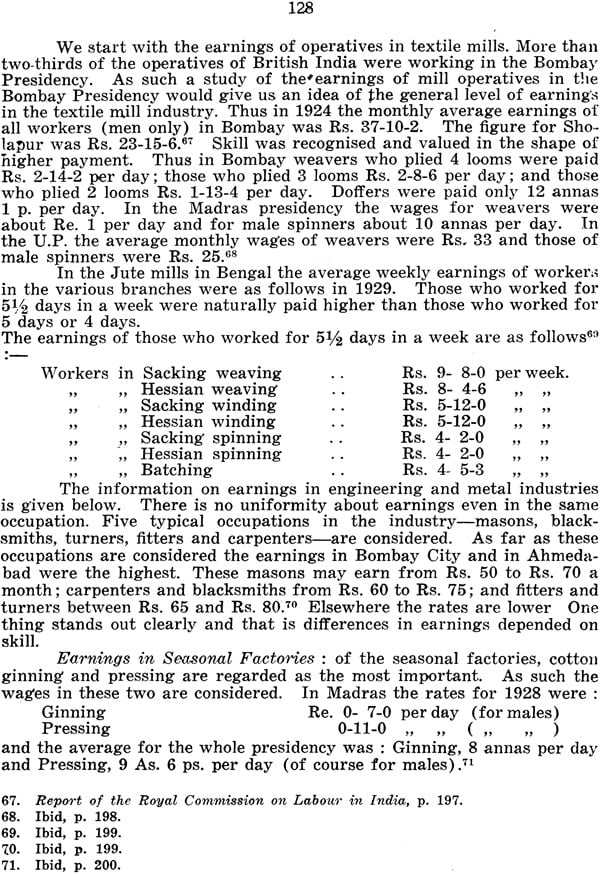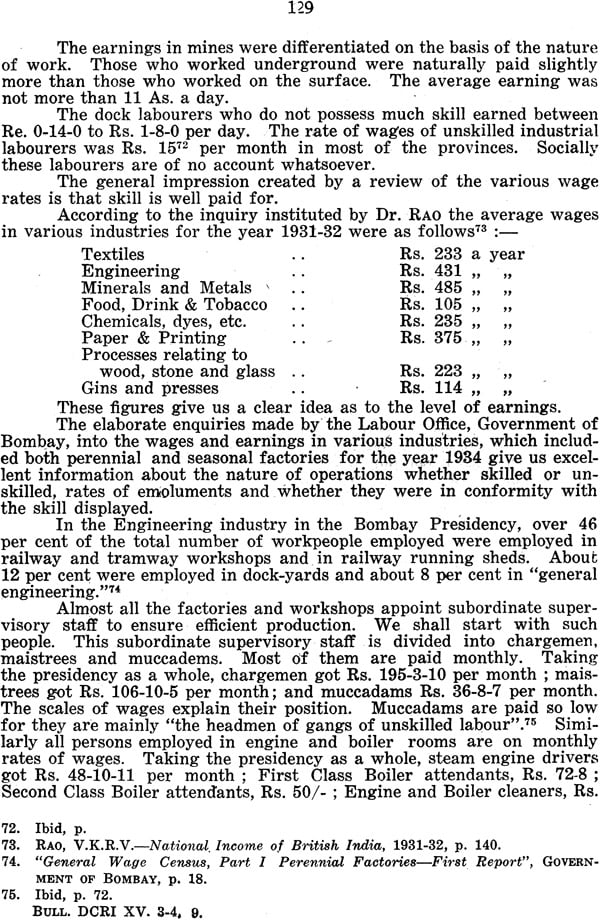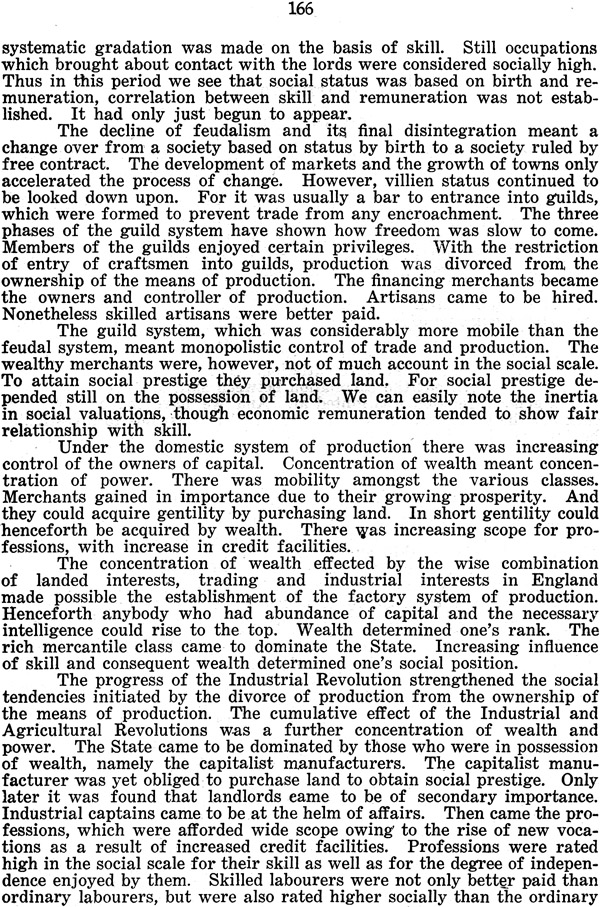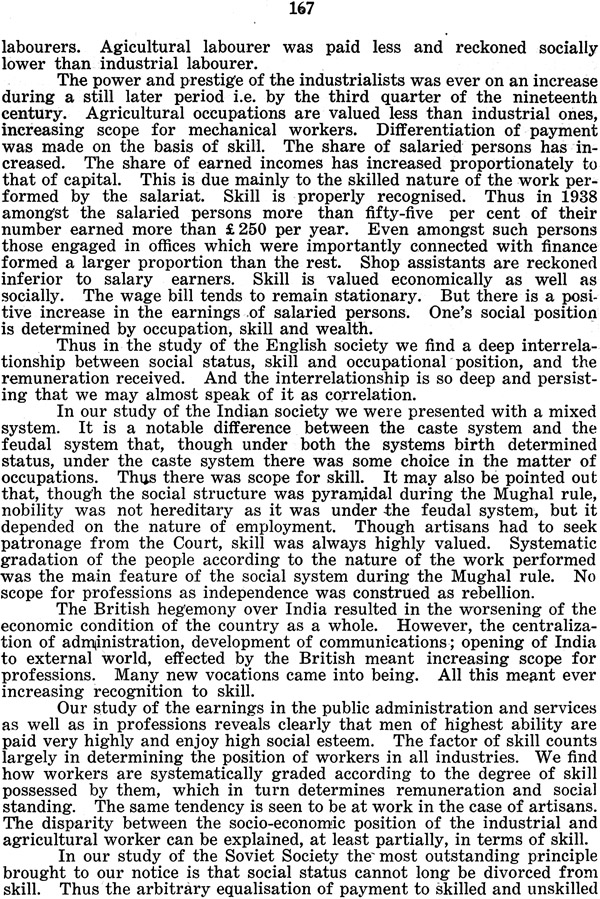
Social Differentiation and Differentiation in Emoluments (An Old and Rare Book)
Book Specification
| Item Code: | NAM745 |
| Author: | Y. B. Damle |
| Publisher: | Deccan College Postgraduate and Research Institute |
| Language: | English |
| Edition: | 1955 |
| Pages: | 188 |
| Cover: | Paperback |
| Other Details | 10.0 inch x 7.5 inch |
| Weight | 310 gm |
Book Description
The present study arises out of the dissertation prepared for the Ph.D. degree in Sociology of the University of Bombay. It is needless to say anything about the nature and the scope of the study for it will be adequately discussed in the introduction. A word of explanation about the delay in publication is, however, necessary. It was felt that the study be revised and brought up-to-date, Likewise there was a desire to supplement the same by field work. But the pressure of work and certain other difficulties that normally exist in such cases precluded carrying out the wishes. Besides the idea that the study be presented in its original form as a working hypothesis prevailed. It is hoped to pursue the study along the lines mentioned above at a later date.
The author wishes in all humbleness to express his gratitude to Prof. Dr. G. S. Ghurye of the University of Bombay who guided him in the preparation of the dissertation. The inspiring and the learned guidance of Prof. Ghurye is largely responsible for the completion of the study. The University of Bombay has greatly helped the author by awarding a Research Scholarship and Fellowship while the study was in progress. Thanks are due to Dr. I. P. Desai of M. S. University of Baroda who encouraged the author in publishing the study. No expression would be adequate to thank Dr. S. M. Katre, Director Deccan College Post-graduate and Research Institute, Poona, but for whose help the study would not have seen the light of the day.
As very correctly pointed out by NORTH, "social differentiation is at once a chapter of general sociology and an approach to social psychology." The very fact that the differences among human beings are socially recognised implies social stratification. Stratification implies division into higher and lower layers. We are interested in the relationship between the differences, for instance, in the relationship between the social differences, the economic differences, the political differences and the occupational differences.
It is customary to divide social differences into various categories. Thus it is said that the differences of function, differences of rank, differences of interest, differences of culture are "significant social differences." Likewise, it is said that in the main society is stratified economically, politically and occupationally. Obviously enough this classification of social differences into four significant types or that of stratification into three important forms is meant to clarify the proper nature of social differentiation and social stratification. Such classification does not imply fixity. All that is implied in such classification is that society is stratified. And the economic, the occupational, the political, etc., are the factors of social classification. The essence of social stratification is the "differential ranking of the human individuals who compose a given social system and their treatment as superior and inferior relative to one another in certain socially important respects."
Now it may be legitimately questioned how this dichotomy of the higher and the lower or the superior and the inferior was brought about The biological factor plays an important role in giving' rise to the phenomenon. In fact North had to admit that the biological factor cannot be neglected for the "biological variations provide a very great deal of foundation for social distinctions." This is alright so far as the 'foundation' is concerned. But it fails to give explanation of later development. Here comes in the social factor. "Social organization has developed marked social distinctions when there has been nothing in the nature of the individual which would indicate why he should occupy the position assigned to him." In elucidation of this it may be added that the norms upheld by the society in question play quite an important part in such division of the people into higher and lower or superior and inferior grades. If we analyze the actions of individuals for determining their position in the social system, it can be easily seen that their actions have to be analyzed with reference to the norms of action upheld by society. The actions have to be judged in the light of the normative pattern of the society. Thus it is possible to speak of moral system as the central factor in differential evaluation of persons," Moral superiority would in that case brims 'respect' while its antithesis would cause 'disapproval', indignation and 'hence the lowering of the individual.
The correspondence between the stratification of society into higher .and lower class does not always coincide with its stratification into higher .and lower economically, politically, occupationally, etc. Though those who enjoy economic privileges usually enjoy political and occupational privi1eges too .. The correlation is not always perfect. The factors which bring about social classification are not directly responsible in the same proportion for the phenomenon. That is why it is very difficult to define the concept of 'social class' in precise terms, as we shall see later. It has to be admitted that a totality of factors is to be taken into account for the real understanding of the phenomenon of social differentiation.
Nonetheless we may try to find out the degrees of importance of the various factors concerned. But various people have tried to explain the phenomenon in entirely political or economic or occupational terms. Thus Plato, Agrippa, Sallustius, Voltaire, D'aeth, Raynal, Godwin, Bernstine, to mention the more famous ones have tried to explain it in economic terms. Helvetius, A. Bauer, Blondel, S. Simon, etc., gave explanation in political terms. Turgot, K. Bucher partly, G. Schmoller, Taussig and many others have tried to explain the phenomenon in occupational terms. Such theories suffer due to their one-sidedness and fail to give us adequate explanation of the phenomenon of social classification. It may be, however, correct to speak of the predominance of one factor in a particular period. For example, we may speak of the dominating role played by the economic factor in the later stage of the development of social organization. This is not to deny the importance of other factors. Thus "economic factors undoubtedly played a large part in forcing the transition from a regime of slavery to one of serfdom, although the position of the serf was still chiefly determined by the political factor in the form of military control." Later on, however, the "economic and cultural factors became more powerful than the political in holding peoples together, and economic forces, therefore, secured a larger field for determining social differences. The increasing hold of the economic forces in the determination of social differences can be easily seen in the various theories propounded. We shall state some of the important theories, which embody attempts to prove the dominance of economic forces.
Since the development of systematic thinking on social problems, the minds of social philosophers have been engaged in finding out the relation between economic forces and social development in general. It would be wrong to suppose that Karl Marx was the pioneer in recognizing the importance of the economic factor. Right since Aristotle we find recognition of the importance of economic factors.
With the development of modern industry and commerce which date from the seventeenth century, economic forces came to play a role important enough to attract the attention of thinkers of social problems. "The intensification of the social question in the nineteenth century was largely responsible for the rise of a new type of materialism, the dialectical materialism of Karl Marx and Engels." As a result of his careful investigations into the social and economic conditions of the people, Marx came to the conclusion that legal relations and political forms in a society, far from being self-dependent or expressions of the developing human spirit, are rooted in the material conditions of living. Engels is even more emphatic on the issue, For he maintains that "the causes of all social changes and political revolutions are to be sought not in men's brains, not in Man's better insight into eternal truth and justice, but in changes in the modes of production and exchange. They are to be sought not in philosophy but in economics of each particular epoch."
Here are some of the main tenets of the doctrine of historical materialism. In the first instance the 'sum total of the relations of production' constitutes the economic structure of a society. And the whole culture complex is founded in these 'relations of production.' Inevitably it follows that the whole culture complex is conditioned by the economic structure. Thus "property relations are the formal expressions or signs of these social relations of production.'?" Naturally society comes to be divided into two main classes, those who own property and those who merely toil". "The stratifying principle consists in the ownership, or the exclusion from ownership, of means of production such as factory buildings, machinery, raw materials and the consumers' goods that enter into the workman's budget. We have thus, fundamentally two and only two classes, those owners, the capitalists, and those have-nots who are compelled to sell their labour, the labouring class or proletariat." Thus Karl Marx has viewed all social phenomena and social development mainly from the economic point of view.
Achille Loria, an illustrious Italian scholar and an eminent social theorist, argues that the basic foundations of society are, purely economic. He contends that economic factors played the decisive role in later social development, especially since the advent of industrial capitalism. The "connective institutions of morality, law and politics" are dominated by the economic factor. Thus it is that we find the presence of two classes of population in every society. Of the two distinct classes "one class lives without working, the other works without living." Capitalistic property attains control over the 'connective institutions' in order to maintain its power. In fact "the law is derived from economic conditions the law is also a monopoly of wealth, and in the Temple of Themesis there is no place reserved for the labourer." Further the possession of property enables the maintenance of political power so that legislation which is favourable to the propertied class alone obtains. Thus economic conditions form the basis of politics. A vicious circle par excellence is thus created.
Werner Sombart goes so far as to call this age the 'Economic Age'. According to him the economic and the so-called material import have gained supremacy over all other values. Thus not even cultural activity is left free from the impress of the economic import, The economic import is permeating our life so much "that in public life there is but one basis and measure of success, that of wealth in money; and only one order of rank, that of money or income."
Veblen, who has become famous for his thesis of the Leisure Class, takes it for granted that this is purely an economic age where all other values have been out-stripped by the economic values. "The institution of a leisure class is the outgrowth of an early discrimination between employments, according' to which some employments are worthy and others unworthy." Exploit has always been considered as honourable. Day-to-day work has always been classed as unworthy. In the economic age employments have come to be divided into pecuniary and industrial activities. This distinction corresponds to the old distinction between exploits and day to day work. Activities which have to do with acquisition or ownership are classed as pecuniary activities. Day-to-day activities which have to do with labour and production are styled as industrial activities.
Ownership forms the immediate function of the leisure class. Then follow acquisition and accumulation of wealth. Naturally enough "employments fall into a hierarchical gradation of- reputation. Those which have immediately to do with ownership on a large scale are the most reputable."23 Next to these in reputability stand those which have indirectly to do with ownership such as financeering, banking, law, etc. The occupations which satisfy secondary needs are classed higher than those which satisfy lower needs. Manual labour is treated with contempt. All this amounts to isolation of the poor. Social standing is thus determined by. the nature of employment. And employments which can be classed as pecuniary are alone treated as worthy. Consequently, economic affluence alone means high social standing'. Economic force thus reigns supreme in determining social differences.
Gunnar Landtman, discussing wealth as the factor making for social differentiation, states that "it is in conjunction with the dissimilarity of individual endowments that inequality of wealth has conduced to the rise of social differentiation. As a matter of course the difference as regards property in many cases goes hand in hand with difference in personal qualities But property has at the same time given to social differentiation a stamp of its own in distinction from that depending on purely personal traits of character difference in property renders the grouping of classes far more permanent than would be the case under the influence of personal superiority or inferiority alone." Wealth is such an important factor that the possessor. of wealth is at an advantage over others. Thus the rich are elevated to the privileged rank while the poor are degraded. "It is noticeable that wealth in many cases constitutes a condition for nobility and is sometimes even rated higher than noble descent."
Harold J. Laski maintains that political equality can be of no avail unless accompanied by economic equality, for classes are determined by wealth. The very fact that the principle of 'cash nexus' was the guiding principle, made for the weakness of society. "It broke down the principle of birth as the foundation of privilege and replaced it with the principle of wealth." Birth no longer determines status, unless accompanied by possession of substantial wealth. Hence acquisition of wealth has become the "Central principle of social organisation."
R. H. Tawney maintains that wealth enables men to attain high social standing through the opportunities it affords. The inevitable consequence of this is that those without wealth have just to labour. Where the system of property operates it is futile to ask for equality of rights. Equality of rights, even if established would cease to function owing to "unequal powers springing from the exercise of equal rights in a world where property and the inherited wealth and the apparatus of class institutions have made opportunities unequal."
It can be very easily seen that the most common feature of the theories stated above is the general relationship between economic forces and social classification. Further these theories hint at correlation between social standing' and economic position.
We cannot, however, be satisfied with such general treatment of the problem. For us the problem assumes a much more specific form. Thus our problem is to find out the interrelationship between social differentiation and differentiation of economic emoluments. To be able to do so we proceed to study the interrelation between social status and remuneration received for work. In doing so we are mindful of the factor of skill, which comes in to explain adequately why particular remuneration is paid for a particular kind of work. Thus our problem is at once threefold. We have to work out the interrelation between social status, skill and the occupational position resulting there from, and remuneration.
| Preface | vii | |
| Introduction | 1-12 | |
| Chapter I | From Feudal time to industrialism -1085 to 1760 A.D. | 13-47 |
| Chapter II | The industrial revolution and after -1760 to 1857 A.D. | 48-67 |
| Chapter III | Modern period - imperialist Era- 1880 to 1939 A.D. | 68-87 |
| Chapter IV | India before the establishment of the British rule- 1500 to 1857 A.D. | 88-109 |
| Chapter V | The establishment of the British rule and after - 1858 to 1939 A.D. | 110-137 |
| Chapter VI | Study of society in the U.S.S.R.- A planned society - 1917 to 1939 A.D. | 138-164 |
| Chapter VII | Conclusion | 165-168 |
| Bibliography | 169-180 |
